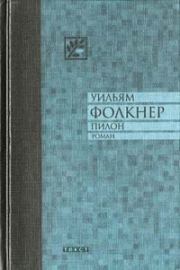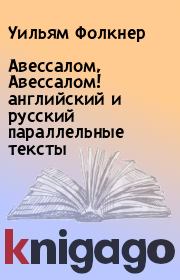Уильям Фолкнер - Collected Stories
 | Название: | Collected Stories |
Автор: | Уильям Фолкнер | |
Жанр: | Классическая проза | |
Изадано в серии: | неизвестно | |
Издательство: | Perfection Learning | |
Год издания: | 2010 | |
ISBN: | 9780756991555 | |
Отзывы: | Комментировать | |
Рейтинг: | ||
Поделись книгой с друзьями! Помощь сайту: донат на оплату сервера | ||
Краткое содержание книги "Collected Stories"
This magisterial collection of short works by Nobel Prize-winning author William Faulkner reminds readers of his ability to compress his epic vision into narratives as hard and wounding as bullets. Among the 42 selections in this book are such classics as “A Bear Hunt, ” “A Rose for Emily,” “Two Soldiers,” and “The Brooch.”
Читаем онлайн "Collected Stories". [Страница - 3]
- 1
- 2
- 3
- 4
- 5
- . . .
- последняя (199) »
“Get out of my way, nigger,” his father said, without heat too, flinging the door back and the Negro also and entering, his hat still on his head. And now the boy saw the prints of the stiff foot on the door jamb and saw them appear on the pale rug behind the machinelike deliberation of the foot which seemed to bear (or transmit) twice the weight which the body compassed. The Negro was shouting “Miss Lula! Miss Lula!” somewhere behind them, then the boy, deluged as though by a warm wave by a suave turn of carpeted stair and a pendant glitter of chandeliers and a mute gleam of gold frames, heard the swift feet and saw her too, a lady perhaps he had never seen her like before either in a gray, smooth gown with lace at the throat and an apron tied at the waist and the sleeves turned back, wiping cake or biscuit dough from her hands with a towel as she came up the hall, looking not at his father at all but at the tracks on the blond rug with an expression of incredulous amazement.
“I tried,” the Negro cried. “I tole him to…”
“Will you please go away?” she said in a shaking voice. “Major de Spain is not at home. Will you please go away?”
His father had not spoken again. He did not speak again.
He did not even look at her. He just stood stiff in the center of the rug, in his hat, the shaggy iron-gray brows twitching slightly above the pebble-colored eyes as he appeared to examine the house with brief deliberation. Then with the same deliberation he turned; the boy watched him pivot on the good leg and saw the stiff foot drag round the arc of the turning, leaving a final long and fading smear. His father never looked at it, he never once looked down at the rug.
The Negro held the door. It closed behind them, upon the hysteric and indistinguishable woman-wail. His father stopped at the top of the steps and scraped his boot clean on the edge of it. At the gate he stopped again. He stood for a moment, planted stiffly on the stiff foot, looking back at the house. “Pretty and white, ain’t it?” he said. “That’s sweat. Nigger sweat. Maybe it ain’t white enough yet to suit him. Maybe he wants to mix some white sweat with it.”
Two hours later the boy was chopping wood behind the house within which his mother and aunt and the two sisters (the mother and aunt, not the two girls, he knew that; even at this distance and muffled by walls the flat loud voices of the two girls emanated an incorrigible idle inertia) were setting up the stove to prepare a meal, when he heard the hooves and saw the linen-clad man on a fine sorrel mare, whom he recognized even before he saw the rolled rug in front of the Negro youth following on a fat bay carriage horse a suffused, angry face vanishing, still at full gallop, beyond the corner of the house where his father and brother were sitting in the two tilted chairs; and a moment later, almost before he could have put the axe down, he heard the hooves again and watched the sorrel mare go back out of the yard, already galloping again. Then his father began to shout one of the sisters’ names, who presently emerged backward from the kitchen door dragging the rolled rug along the ground by one end while the other sister walked behind it.
“If you ain’t going to tote, go on and set up the wash pot,” the first said.
“You, Sarty!” the second shouted. “Set up the wash pot!”
His father appeared at the door, framed against that shabbiness, as he had been against that other bland perfection, impervious to either, the mother’s anxious face at his shoulder.
“Go on,” the father said. “Pick it up.” The two sisters stooped, broad, lethargic; stooping, they presented an incredible expanse of pale cloth and a flutter of tawdry ribbons.
“If I thought enough of a rug to have to git hit all the way from France I wouldn’t keep hit where folks coming in would have to tromp on hit,” the first said. They raised the rug.
“Abner,” the mother said. “Let me do it.”
“You go back and git dinner,” his father said. “I’ll tend to this.”
From the woodpile through the rest of the afternoon the boy watched them, the rug spread flat in the dust beside the bubbling wash-pot, the two sisters stooping over it with that profound and lethargic reluctance, while the father stood over them in turn, implacable and grim, driving them though never raising his voice again. He could smell the harsh homemade lye they were using; he saw his mother come to the door once and look toward them with an expression not anxious now but very like despair; he saw his father turn, and he fell to with the axe and saw from the corner of his eye his father raise from the ground a flattish fragment of field stone and examine it and return to the pot, and this time his mother actually spoke: “Abner. Abner. Please don’t. Please, Abner.”
Then he was done too. It was dusk; the whippoorwills had already begun. He could smell coffee from the room where they would presently eat the cold food remaining from the mid-afternoon meal, though when he entered the house he realized they were having coffee again probably because there was a fire on the hearth, before which the rug now lay spread over the backs of the two chairs. The tracks of his father’s foot were gone. Where they had been were now long, water-cloudy scoriations resembling the sporadic course of a lilliputian mowing machine.
It still hung there while they ate the cold food and then went to bed, scattered without order or claim up and down the two rooms, his mother in one bed, where his father would later lie, the older brother in the other, himself, the aunt, and the two sisters on pallets on the floor. But his father was not in bed yet. The last thing the boy remembered was the depthless, harsh silhouette of the hat and coat bending over the rug and it seemed to him that he had not even closed his eyes when the silhouette was standing over him, the fire almost dead behind it, the stiff foot prodding him awake. “Catch up the mule,” his father said.
When he returned with the mule his father was standing in the black door, the rolled rug over his shoulder. “Ain’t you going to ride?” he said.
“No. Give me your foot.”
He bent his knee into his father’s hand, the wiry, surprising power flowed smoothly, rising, he rising with it, on to the mule’s bare back (they had owned a saddle once; the boy could remember it though not when or where) and with the same effortlessness his father swung the rug up in front of him. Now in the starlight they retraced the afternoon’s path, up the dusty road rife with honeysuckle, through the gate and up the black tunnel of the drive to the lightless house, where he sat on the mule and felt the rough warp of the rug drag across his thighs and vanish.
“Don’t you want me to help?” he whispered. His father did not answer and now he heard again that stiff foot striking the hollow portico with that wooden and clocklike deliberation, that outrageous overstatement of the weight it carried. The rug, hunched, not flung (the boy could tell that even in the darkness) from his father’s shoulder struck the angle of wall and floor with a sound unbelievably loud, thunderous, then the foot again, unhurried and enormous; a light came on in the house and the boy sat, tense, breathing steadily and quietly and --">- 1
- 2
- 3
- 4
- 5
- . . .
- последняя (199) »
Книги схожие с «Collected Stories» по жанру, серии, автору или названию:
 |
| Вирджиния Вулф - Ненаписанный роман Жанр: Классическая проза Год издания: 1989 |
 |
| Артур Игнатиус Конан Дойль - Блюмендайкский каньон Жанр: Классическая проза Год издания: 1998 |
Другие книги автора «Уильям Фолкнер»:
 |
| Уильям Фолкнер - Пилон Жанр: Классическая проза Год издания: 2002 |
 |
| Уильям Фолкнер - Весло Жанр: Детектив Год издания: 1993 |






